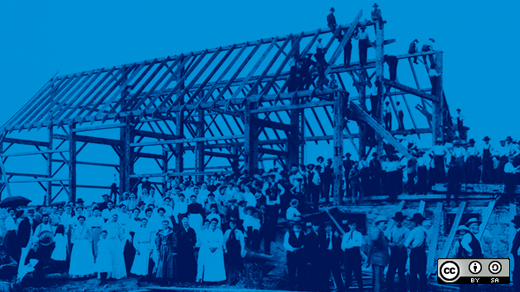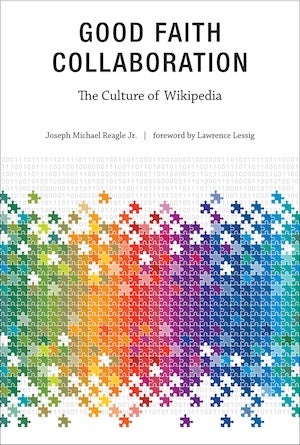Wikipedia is among the world's most widely recognized examples of mass collaboration. Most people also know Wikipedia is open for anyone to contribute. But what does open mean? What are the rules? Who writes them? And how do they solve inevitable disputes over content?
Joseph Michael Reagle, Jr. has written a new book, “Good Faith Collaboration: The Culture of Wikipedia,” which examines what I believe is one of the most fascinating aspects of Wikipedia: Its collaborative climate--the culture, the greater mission, and the moral foundation that many Wikipedians share. In other words, how it gets things done.
In the book Reagle details the history of Wikipedia and what compels people to contribute to its mission of creating a universal encyclopedia. He examines the rules Wikipedians follow, from their guiding principles that help them make decisions to how they reach consensus on content. The result is a very interesting and in-depth look into not only the technical side of what makes Wikipedia tick, but the real soul of the organization and its contributors. The wiki provided the platform, but people created the processes. This is their story.
Reagle is an Adjunct Professor in the Department of Media, Culture, and Communication at New York University. In Fall 2010, he will be a fellow at the Berkman Center for Internet and Society at Harvard Law School.
We had the chance to ask Reagle a few questions about his new book, which is officially released this week. You can order your copy here.
1. Q: Wikipedia remains one of the most widely recognized examples of open source collaboration. You mention several examples of how Wikipedia's guiding principles and core processes mirror that of the open source community and were influenced by them. Can you talk more about those similarities?
A: Jimmy Wales has noted that open source was an inspiration to him. So I don't think it's surprising to see similarities such "many hands make light work," modularity, incrementalism, and a high degree of openness at the outer boundary of the community and a mix of governance models within its center (e.g., consensus, meritocracy, and even autocracy -- think "benevolent dictator.") And, most importantly, because of the license, the work can be forked -- though I think a successful fork of Wikipedia is less likely than what we see in software projects. Indeed, while Wikipedia might be widely recognized as an example of open source collaboration, it is also atypical. Most significantly, while software can be compiled, tested, and benchmarked, natural language prose cannot, so Wikipedia might be more susceptible to "bugs" and bunk.
2. Q: One of the oldest misconceptions about Wikipedia is that it is entirely open in the broadest definition: No boundaries. No rules. Anything goes. While your book examines in detail the processes, rules, and, in particular, cultural norms the organization has established for developing content collaboratively. How does Wikipedia balance the principles behind the motto of “the free encyclopedia anyone can edit,” and the personal mission one individual might have to share their bias with the world?
A: This question of openness is a fascinating one, and I ultimately conclude that there is no such thing as perfect openness. Rather, there is a delicate balancing act between being too open and too closed, as Clay Shirky has noted. You must be open enough to be innovative, so as not to become overly insular, but still but defend against external threats -- such as the feared neo-Nazi attack against Wikipedia. For example, Wikipedia would be closed down if it was completely "open" and had no controls against vandals. And so wikis permit a smarter sort of openness (including vandal controls) and lots of norms (including formal policies) that attempt to maximize openness' benefits and minimize its detriments.
3. Q: You write about two core stances Wikipedia takes when making decisions about content: Achieving a neutral point of view and assuming good faith. Some people might argue there is no truly neutral point of view, and that Wikipedia is particularly susceptible to this bias because it is open. I like the example you used of a traditional encyclopedia that may have a similar bias, but without transparency, debate, or public scrutiny. Could you tell us more about how they apply neutral point of view and good faith in assessing content from the community?
A: I think Neutral Point of View is probably the most misunderstood thing about Wikipedia. Some scholars are very suspect of any sort of claim toward a perfectly objective knowledge and everyone knows that information, such as the news, is susceptible to spin and bias. But "NPOV," as Wikipedians refer to it, while perhaps poorly named, is ultimately pragmatic. It is not so much about the content you might find at Wikipedia, but the stance you should take as a contributor. In short, given this is an encyclopedia, contributors should address the range of verifiably sourced claims about the topic. If it is contentious, don't partake of the argument, but describe it. I argue this is an important collaborative tool in that two people, who disagree about a contentious topic, could nonetheless work together to write a good article about the history and arguments associated with that topic. Of course, this does not mean that everyone abides by these norms, or even that experienced and well intended people sometimes don't get overheated. Indeed, we seem to be all too prone to flame wars online. Hence, I argue Wikipedia needs its "assume good faith" norm to counteract Godwin's Law. If you remember from the USENET days, Mike Godwin noted that as the length of a discussion thread increased, so did the probability that someone would liken someone else to a Nazi. So, it is important to remind ourselves that while someone might have made an edit that we don't like or think is useful, we shouldn't jump to the conclusion that they are out to destroy the project; they might be a newbie, or perhaps just having a bad day.
4. Q: One of the most fascinating aspects of Wikipedia culture is how they manage to reach consensus and resolve the inevitable conflicts. They don't vote, in fact, they resist the idea of voting. They do encourage an open debate. Can you tell us how the consensus standard works?
A: It succeeds and fails by being argued about a lot! In the chapter where I focus on consensus, I talk about a very prominent case in which those concerned about a relatively trivial issue (how best to disambiguate the names of articles about television shows) couldn't agree about what consensus means. It is not as if consensus is a perfect decision-making process, it is very conservative and slow. It is just that it is often a better way to make decisions relative to its alternatives. So, it forces people to engage substantively, rather than simply politicking. In a community as open as Wikipedia, with anonymous contributors even, it is not hard to see how difficult "democracy" can be, hence the Wikipedia aphorism that "voting is evil." This recognizes that voting can be easily gamed online, but substantive debate is less prone to manipulation -- but not completely so.
5. Q: It seems that the processes and rules that guide Wikipedia emerged over time as a result of the unique nature of open collaboration. You quoted Clay Shirky who said, “Process is an embedded reaction to prior stupidity.” Can you tell us more about how and why Wikipedia goes about creating process? How do principles of good faith play a part?
A: Wikipedia's founders, particularly Larry Sanger, have noted how they didn't appreciate how important the cultural aspects of the project were at its start: people should just get on with writing the encyclopedia. Fortunately, they did specify a few foundational norms early on (e.g., openness, consensus, and NPOV) and as the community faced difficult situations, they penned policy to help prevent those issues from recurring. This is natural to organizations, as is the danger that process becomes so complex and heavy, that it introduces an unnecessary learning curve; provides opportunities for some to "lawyer" the letter of the policies, rather than abide by their spirit; and inhibits the freedom to make the sort of mistakes that are hallmarks of innovation. So, Wikipedians do have to remind themselves not to get overly hung up on policy, but to simply let themselves and others "be bold" (and perhaps even "ignore all rules") but then be willing to "assume good faith" if you find others have made a mistake.
6. Q: One of my favorite examples in your book of how Wikipedia maintains good faith is concerning the topic of titles. The title of “admin” comes with no special additional powers, and even more interesting is the title of the person who hands out that title: “bureaucrat,” which was deliberately given this name because they didn't want anyone to be proud to have it.
A: It sometimes surprises me just how egalitarian Wikipedia strives to be. While some of this is no doubt well intended and generous, I sometimes wonder if there's also an echo of the Roman Republic. It is not as if the Roman Senate felt that everyone was equal (i.e. the slaves and plebeians were not the equals of patricians) but they didn't want to see any one of their peers become too powerful. So, Wikipedians have purposely worked to downplay formal titles and distinctions. However, like other open source communities, Wikipedia does have an informal "benevolent dictator" which is another fascinating and complex topic, and the subject of another chapter. In any case, even if admins were renamed to "janitors," as has been proposed, I suspect it'd still be a position people strive to achieve. While it is part of Wikipedia's ethos to say admins and bureaucrats have no extra power, it is reasonable to argue they do in fact have power. Power is a feature of social organization and human desire, but the important thing is that Wikipedia is cognizant of this and tries to dampen or make productive use of it.
7. Q: What advice would you give companies who want to apply Wikipedia's cultural principles when working within communities both inside and outside of company walls?
A: I conclude the book by writing I don't believe there is any such thing as "wiki pixie dust." Wikis do permit asynchronous, incremental, and non-brittle contributions (i.e., it is easy to revert a mistake), but using them is not a guarantee of success. Similarly, there is much to learn from Wikipedia's collaborative culture, but one shouldn't approach this as a simple cultural graft or transplantation. The idea of Neutral Point of View doesn't necessarily make sense for businesses, or even other wikis. Ward Cunningham's original wiki was not neutral: it advocated for software patterns. However, I do think that there is a general lesson: we should look for ways to facilitate fast and flexible collaboration that is forgiving with respect to what the technology enables and in our attitudes towards our peers. For example, we might conceive of process as being less about reactive strictures and more as a sharing of best practices among collaborators.







5 Comments